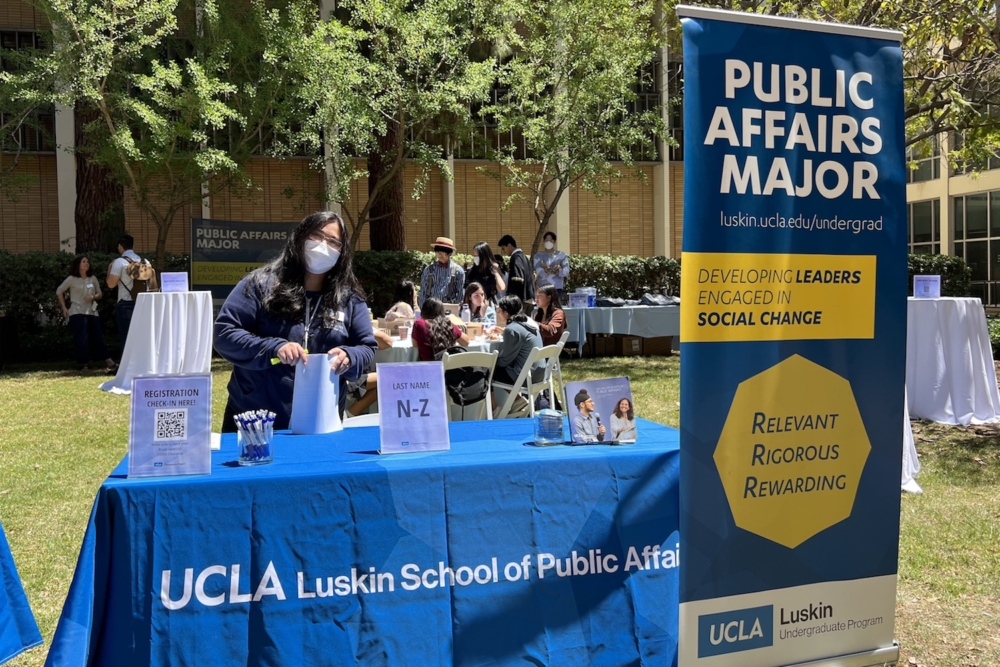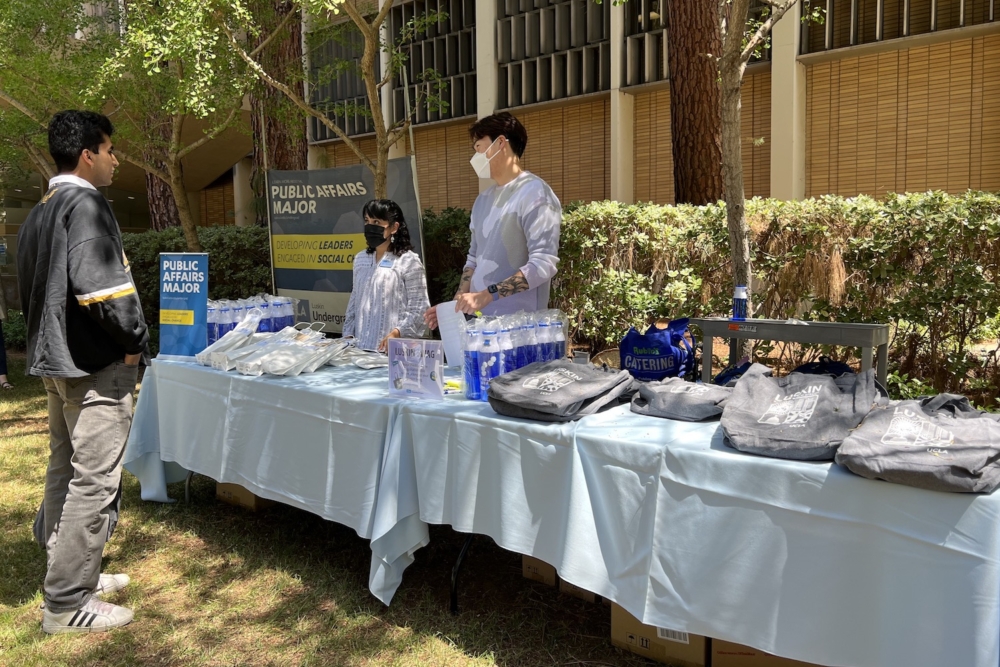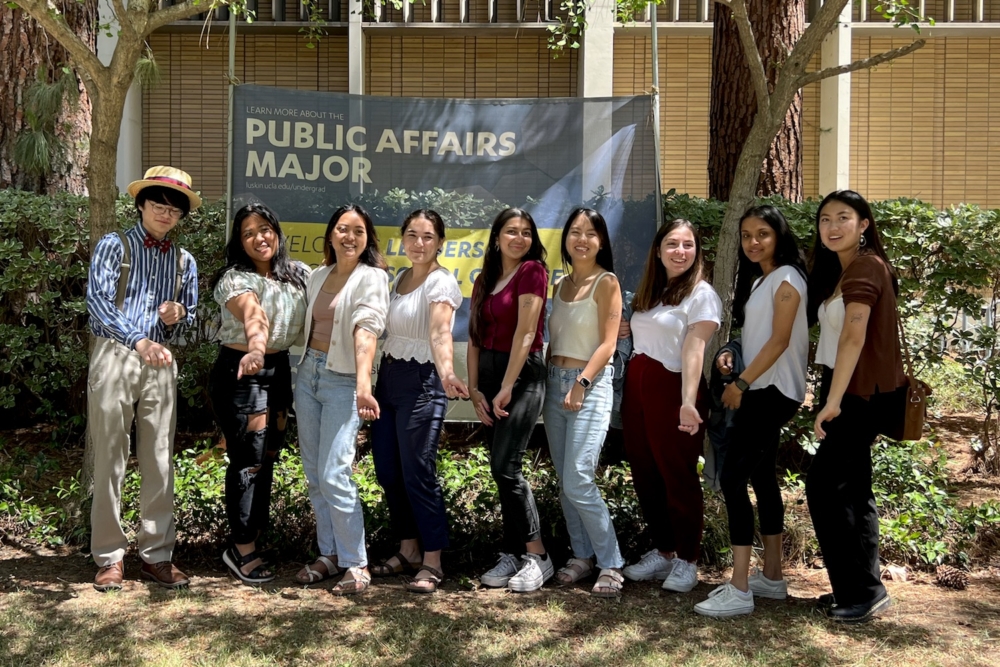By Mary Braswell and Joanie Harmon
Growing up amid the ancient redwoods of Sonoma County, Amy Stanfield developed a deep connection to trees, even greeting her favorites by the names she gave them as a little girl.
“You can stand in the forest and then look up and you just have this very awe-inspiring feeling looking up at these insanely tall, old, historic trees,” Stanfield said. “Redwood trees are really just a symbolic and beautiful part of my life.”
So when the third-year public affairs major spotted a new course on offer in spring quarter — “Trees in the City,” taught by Associate Professor of Urban Planning Kirsten Schwarz — she quickly enrolled.
“I think all the students came to this course with a love of trees,” Schwarz said. “I don’t want them to lose that, but I do want them to think a little bit more critically about the role of trees in the city, and who might benefit from them.”
Trees tell a complex story, touching on water use, climate change, gentrification and even mundane considerations like sap falling on cars.
Schwarz’s course examines urban forestry through an environmental justice lens, weaving together social sciences, natural sciences and fieldwork with the Los Angeles nonprofit TreePeople.
It’s one of several innovative courses that illustrate the UCLA Luskin public affairs major’s emphasis on deep engagement in civic life and rigorous scholarship that draws from many disciplines.
Also new in spring 2021 has been Public Affairs 125, “Creating Safe and Welcoming Schools,” taught by Social Welfare Professor Ron Avi Astor, an authority on school safety and student well-being.
Astor, who has a joint appointment with the UCLA School of Education and Information Studies, said he designed the curriculum with a holistic approach to enhance how universities prepare future educators, social workers, psychologists, administrators and policymakers.
“The new vision proposes that schools won’t just respond to crisis,” Astor said. “It will recognize the current inequities in the system and create school settings that uplift and inspire students — graciously creating a community of educators, peers and families that will elevate the aspirations of each child.”
The course incorporates lessons from more than a year of upheaval endured by schools around the country.
“The dual global pandemics of COVID-19 and our national reckoning with systemic racism after the murder of George Floyd focused a bright light on many blind spots we have as a society when we discuss and research school safety,” Astor said. “The two pandemics highlighted well-documented health, racial and geographic inequities, and started a widespread public conversation about them.”

Students in Public Affairs 125, “Creating Safe and Welcoming Schools,” learn to develop strong policy positions and convey them to the public using the power of media.
With her keen interest in education policy, Stephanie Tapia Onate was glad she could take the new course in her final quarter as an undergraduate.
“I like that it focused on improving the school environment. As a former student of the LAUSD public school system, I know that there’s a lot of work to be done,” said Tapia Onate, who will soon graduate with a public affairs bachelor’s degree, then pursue a master of public policy at the Luskin School in the fall.
What sets “Creating Safe and Welcoming Schools” apart, she said, is the opportunity to personally engage with a wide variety of experts and to develop the practical skills needed to deliver a policy message to the general public.
Astor’s lineup of guest speakers comes from an impressive array of disciplines, including education, public policy, social welfare, psychology, neuroscience, medicine and law. Scholars from UCLA and across the nation, as well as top officials from the Los Angeles Unified School District, have spoken to the class on topics that included racism, bullying, weapons and drug use, mental health and the unique needs of LGBTQ, homeless or undocumented students.
The course has an expansive view of how to make schools a safe space not just for students but for teachers and staff, Tapia Onata said.
“Teachers do deal with a lot of secondary trauma and sometimes they’re often forgotten in the conversation about mental health resources in schools,” she said. “They are one of the communities at school that we do need to support.”
Students in Astor’s class learn to develop strong policy positions then communicate them to the public through op-eds, TED Talks and TikTok campaigns.
Tapia Onate chose to create a series of one-minute policy videos on TikTok, a platform now used frequently for educational outreach as well as entertainment.
“It’s straight to the point, it can deliver your message really fast, and people are more likely to remember what you say in a short video,” she said.
Immersion in civic life is also central to the “Trees in the City” curriculum. During their quarter-long partnership, students worked with TreePeople to fill the nonprofit agency’s most immediate need — turning a voluminous amount of information about the benefits of trees into messaging tailored to local communities.
One team of students developed a school curriculum on the importance of trees that aligned with Next-Generation Science Standards; they even identified sources of potential funding that TreePeople could pursue.
“Students were really interested in ways that environmental stewardship and curriculum centered around trees could be introduced early on,” Schwarz said.
Amy Stanfield said her team chose to highlight the wisdom of those who “lived on the land the longest and most successfully” — Los Angeles’ Indigenous communities.
Through case studies and an infographic, the team demonstrated how to incorporate time-tested traditions into Westernized systems and provided resources to residents who want to connect with local Indigenous leaders.
“We wanted to center our project on amplifying Indigenous people’s voices in the science world and in this type of urban ecology setting,” Stanfield said.
In a happy coincidence, her work with TreePeople will continue next year as she interns with the nonprofit group for her senior capstone research project.
“Trees in the City” has been a perfect match for Stanfield’s interests, which blend ecology, policy and urban planning, as well as film. She is grateful for the personal attention that Schwarz gives each of the 14 students in the upper-division class, and for the interactive curriculum that has deepened her understanding of urban greenspaces.
“Everyone in my college life can’t hear me say enough about it,” Stanfield said. “I get done with class and say, ‘You guys, my tree class is making me so happy!’ ”





